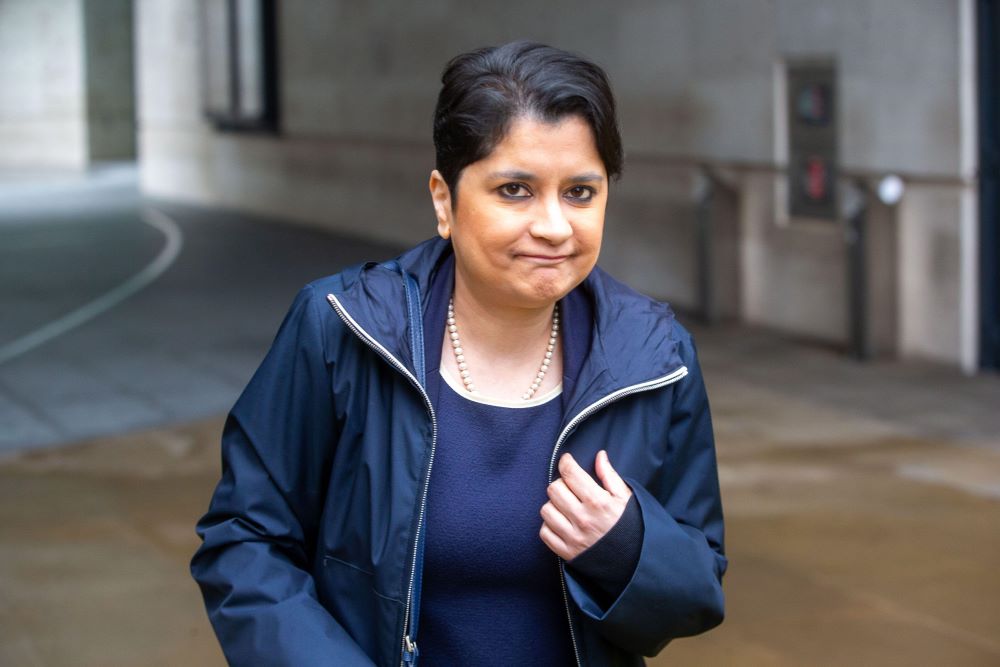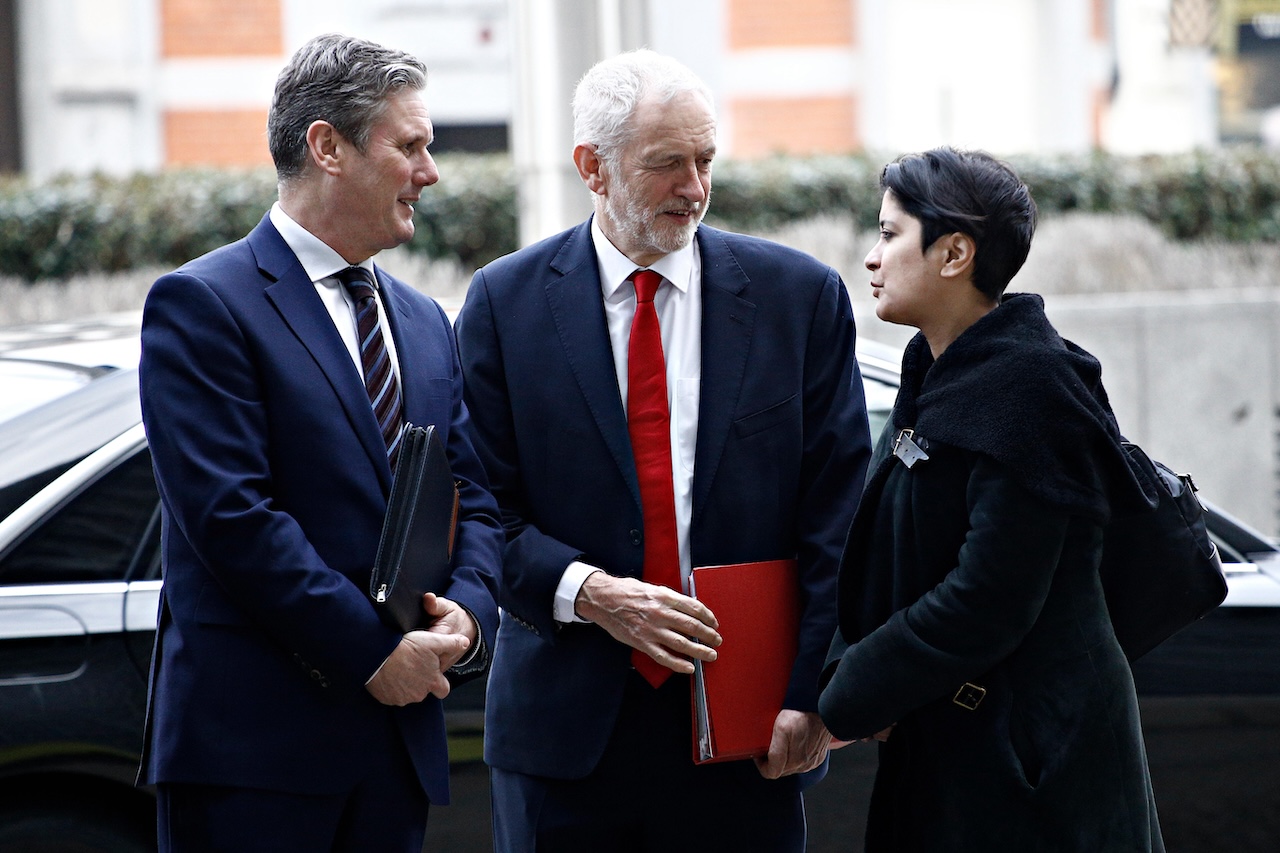Baroness Chakrabarti: 'I am disappointed by my fellow children of migrants'
Baroness Chakrabarti at the Edinburgh International Book Festival in August 2018 (Credit: Gary Doak / Alamy Live News)
9 min read
Labour peer Baroness Chakrabarti talks to Sienna Rodgers about putting forward the case for human rights, why Rishi Sunak and Suella Braverman have broken her heart, and her view on the "appalling" briefing against Diane Abbott
Shami Chakrabarti made her name when she was appointed director of human rights pressure group Liberty aged 34. For stretches of time in that role, which she held for 13 years, she was rarely off our screens. With her signature look – black clothes, pearl necklace, short hair – she was immediately recognisable as the most fierce and eloquent critic of New Labour’s controversial anti-terror measures.
Now a Labour peer, in recent years Baroness Chakrabarti has taken up a similar role in the House of Lords, being consistently at the forefront of fights between peers and the government over human rights – most notably on the plan to send asylum seekers to Rwanda. So concerned was she about the direction of travel under the Conservatives that she wrote a new book defending the very concept of these rights – Human Rights: The Case for the Defence, published by Penguin in May.
The internationalism of Mexican Coca-Cola, but not the internationalism of the Court of Human Rights, which Rishi Sunak brands a ‘foreign court’
“I am personally disappointed by my fellow children of migrants and the way they have turned their rhetoric and their wrath on the most desperate people on Earth, including in small boats,” Chakrabarti says in a withering attack on Tory front benchers who share her British Asian background.
“What breaks my heart about Rishi Sunak and Suella Braverman is they know better because they are the children of migrants like me, and therefore like me they must have sat around the kitchen table and the dinner table listening to their parents' stories. And no doubt they will have experienced racism themselves.
“Having had that experience, to be so hateful and so othering of desperate people in small boats, most of whom will turn out to be genuine refugees, that breaks my heart. I find it so very disappointing. Sometimes I think I'm just glad that my late parents aren't around to see it.”
She continues: “They're so nationalistic, and yet they have benefited personally so much from internationalism. These people have had elite educations. They've been to not just Oxford and Cambridge but the Sorbonne and Stanford University.
“They'll take the internationalism of personal opportunity, but not the internationalism of solidarity. They want for themselves and their family what they won't extend to other people. That hypocrisy is just so very, very disappointing.
“The internationalism of Mexican Coca-Cola, but not the internationalism of the Court of Human Rights, which Rishi Sunak brands a ‘foreign court’, which sits at the heart of the Council of Europe, which was Churchill's legacy.”
Chakrabarti believes these politicians have paved the way for Nigel Farage, who is expected to finally become an MP at this general election after multiple unsuccessful attempts. The Labour peer has met him numerous times over the years, she says, and reveals Farage would even contact Liberty about civil liberties issues such as summary extradition without due process. “Like Boris Johnson, he's capable of being a shape-shifter,” she remarks.
Although a Labour peer, Chakrabarti served as shadow attorney general under Jeremy Corbyn rather than Keir Starmer, and is considered to be on the opposite end of the party’s broad church to the current party leader. Nonetheless, does she believe the fellow barrister, a former director of public prosecutions, will take the lead and heal the relationship between law and politics that has fractured so badly in recent years?
“A promising sign on this has been his unequivocal promise to scrap the Rwanda plan. I take real heart from that,” she replies. “I think that’s coming straight from the rule of law. From not just a professional background, but for lawyers the rule of law is not just a professional toolbox, it’s a core value.” Later, she adds: “In the fractious family that is the labour movement, human rights ought to be the binding agent.”

Chakrabarti is incensed by the way the Rwanda plan was pursued, explaining: “The Supreme Court had already ruled on this! Lots of Conservatives in the House of Lords literally spoke against the Rwanda bill with tears in their eyes. Not because they're particularly woke – like me. Not because they're great proponents even of human rights. But because of the rule of law.
“Because the Supreme Court, the highest court in our land – not an international or 'foreign' court – had already ruled and nothing appreciably had changed. And this was tying the hands of the court to say ‘this is safe’, not just now but for all time!”
She describes it as a “smash and grab approach to politics”, and issues a warning to Conservatives: “I say to these people: careful what you wish for, because you were doing all of this when you had a big majority, and maybe someone else will have a big majority, and what will you say then? Just as you thought it was fine to legislate so that night is day and Rwanda is safe, will you be happy for a Labour government to do things like that, but in a way that you don't like so much?”
That testosterone-fuelled, targeted briefing against Diane was appalling and unedifying
Critics of Chakrabarti might say she is the ultimate judicial activist – a lawyer turned unelected legislator. How does she respond to that charge?
“Totally. I remember being an undergraduate law student, being asked, 'Can you justify the House of Lords?' and thinking, 'Well, this is a short essay: no! Maybe I could double my word count by saying hell no!',” she laughs.
“For a long time I've thought, 'if it ain't broke, don't fix it'. Constitutional reform is of interest to lawyers like me, but it's rarely anybody else's priority,” Chakrabarti adds. However, she may have changed her mind.
“After the Johnson-Sunak period, I wonder if it isn't now broke, like properly broke, and whether at some point there is going to have to be a new settlement involving a written constitution and an entrenched bill of rights. That said, if you're going to do this, you can't spend five minutes over it and you have to do it by consensus.”
Such a huge project doesn’t seem likely when the main parties shy away from areas in desperate need of reform via cross-party working such as social care.
“I guess my real justification to people who think 'you're a hypocrite because you're in the House of Lords' is I work within the system as it is. I do my best within the system as we have it,” she says.
“The House of Lords is a place where you can try to stick up for rights and freedoms and the rule of law on a cross-party basis, and I think my record in the House of Lords demonstrates my efforts to do that. Of course, in the end they can be thwarted because it is an unelected chamber. But it's the system as it is and not the system as I would design it.”
Chakrabarti had a highly charged introduction to party politics after being appointed to chair an inquiry into Labour antisemitism – which became a crisis that engulfed the party and led to the Equality and Human Rights Commission finding breaches of the law – and her peerage attracted criticism from colleagues who thought the optics were bad.
Asked about her 2016 report on antisemitism in the party, she says simply: “The recommendations about speedy and visibly impartial disciplinary structures and the need for education around all forms of racism are worth rereading even today.”
 Keir Starmer, Jeremy Corbyn and Baroness Chakrabarti visit the European Commission in February 2019. (Credit: Alexandros Michailidis/Alamy Live News)
Keir Starmer, Jeremy Corbyn and Baroness Chakrabarti visit the European Commission in February 2019. (Credit: Alexandros Michailidis/Alamy Live News)
The Labour peer is now considered to be out of favour with the current Labour leadership – although she has known Starmer personally for many years.
“It was so long ago that I don’t remember a magic moment but I’ve known Keir for a lot of years,” she says. “When I was a young director of Liberty, now a long time ago, we’d meet regularly and he had previously worked at Liberty before he went to the bar.”
Did she always know Starmer would become a politician? “Yes.” Why? “His interests. There’s nothing wrong with it. A lot of lawyers are politically interested.”
Although they met regularly when he was DPP to discuss issues around the criminal justice system, and he later – as shadow Brexit secretary – commissioned her to write an opinion on the legality of proroguing Parliament, Chakrabarti says she is keen not to be someone who will “suddenly pretend they’ve been somebody’s best friend”.
What does she make of the Diane Abbott saga at the start of the general election campaign? The veteran left-winger first elected in 1987 as the first Black female MP had the whip restored at the end of May but it was reported by The Times on the same day that she would be barred from standing as a Labour candidate. After several days of confusion, Starmer declared she was “free” to stand.
“I want a Labour government. I want the broadest church to ensure that happens,” Chakrabarti says. “Factionalism is a really bad idea. Of course have a battle of ideas, but not the politics of personal destruction.”
The Abbott row was “not the Labour Party at its best”, she adds. “Those responsible – those anonymous Labour sources, and I call them overgrown schoolboys in suits with their feet on the desk – they should reflect on whether that was really so smart. That testosterone-fuelled, targeted briefing against Diane was appalling and unedifying.”
Abbott appeared slightly annoyed when Chakrabarti told the BBC that her friend should “take some time” to think about whether she should be a candidate at the election, quickly clarifying that “I intend to run and to win as Labour’s candidate”. But the peer denies that was the case.
“I’m her friend, not her spokesperson,” she says. “a) It was honest and b) it was for her to announce her intentions and it wasn’t for me to speculate. That’s what that was about. It wasn’t in any way suggesting she should or shouldn’t.”
Considering the fraught start to her time in party politics and her dislike of factionalism, does Chakrabarti regret becoming a politician?
“I’m not a proper politician, in that I’ve never been elected to a PTA or a parish council, but I’ll never regret trying to do my bit for the prospect of a Labour government and a settlement that respects the rule of law, wants to tackle gross inequality of a kind that didn’t exist even when I was child under Thatcher, and the big questions like tech and AI, war and peace, and climate emergency, that require not just better government in Britain but a government that’s prepared to adopt internationalism on the world stage.”
